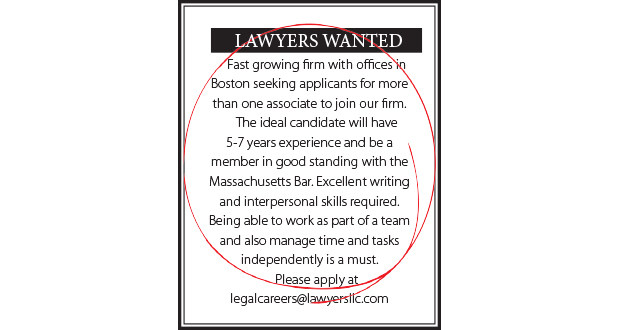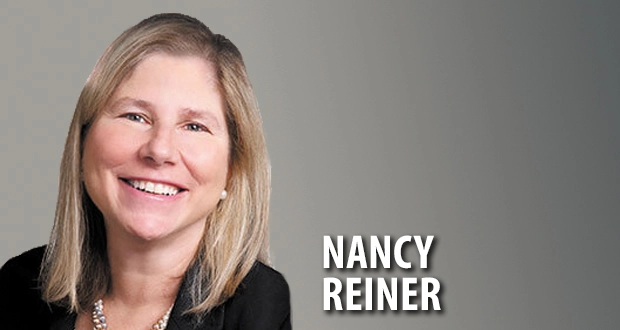
Law firms and corporate legal departments in Massachusetts are facing headwinds trying to find the qualified attorneys they need to fill open positions.
Kenneth J. Albano, managing partner of Springfield-based Bacon Wilson, touts the success of the firm’s 100 attorneys and staff in navigating the last 18 months of the COVID-19 pandemic.
But Albano is less satisfied with the results of his firm’s hiring efforts.
“It has been a challenge getting new blood in the door,” Albano says. “And the quality of candidates has been very poor.”
One sure sign that demand has outstripped supply is the fact that legal recruiters such as Nancy Reiner say they are busier than ever trying to meet the needs of clients desperate to find the right lawyer to fill an open job.
“In the fall of 2020, we started an amazing uptick in searches, and it’s been increasing every month,” says Reiner, who heads the in-house counsel recruiting division at Major, Lindsey & Africa in Boston. “I know we have never seen it this busy.”
Slim pickings?
Going into the pandemic, there was already a “robust” employment market for attorneys — particularly associates — making lateral moves as well as for in-house lawyers, according to Andre L. Campagna, a senior consultant at staffing agency Beacon Hill Legal in Boston.
“COVID didn’t change that demand,” Campagna says. “Especially in the life science in-house space, they didn’t skip a beat.”
The current demand for transactional lawyers — particularly at the associate level — is “off the charts,” he says.
Albano cites two recent hiring experiences as typifying the state of the legal job market.
“We recently had one attorney from New York who responded to an ad for a position in our commercial department,” Albano says. “He’s working in New York but wants to relocate to Boston, and he’s thinking he could be hired by us and be working remotely. That’s just not possible.”
A second hiring attempt by Albano’s firm got off on the wrong foot but seems to have ended well, he reports.
Bacon Wilson recently advertised for a corporate/transactional attorney for the firm’s Springfield office. It received “two or three” applications for the position and interviewed what looked to be the top candidate. The lawyer accepted the firm’s offer of employment on a Monday, only to email the following day that he had changed his mind because he didn’t want to work in western Massachusetts.
“This is what we are dealing with,” Albano says. “We hired No. 2, a lawyer from the Boston/Hartford area with six or seven years of experience. He starts in two weeks and is excited to work in western Mass., so I think we made the right decision.”
In Albano’s estimation, the chances of successfully targeting another firm’s attorney for a lateral move with her or her book of business are unrealistic in the current market.
 “We’ve tried that, and they are just not out there,” he says.
“We’ve tried that, and they are just not out there,” he says.
But not every law firm has had a hard time bringing in new lawyers. Shira M. Diner says her firm, Todd & Weld, hired and onboarded four associates since the pandemic began.
“Our hiring is very cyclical, and we didn’t have any needs when the pandemic began,” says Diner, the Boston litigation firm’s recruitment director. “Midway through the pandemic, we realized we did have needs, and we were all curious as to how it would go.”
Diner says the firm is looking to hire another associate, but unfortunately that process has “slowed down somewhat,” becoming more of a challenge.
“What we’re seeing right now is that lawyers in Boston are busy, there’s a lot of work,” she says. “That coupled with the uncertainty over where the public health crisis goes next has definitely limited the number of applicants we have had. I don’t think as many people are looking now.”
In-house demand
Major, Lindsey & Africa’s Reiner attributes the current demand for in-house lawyers to multiple factors. One is that many would-be job candidates are effectively locked into their current situations.
“You don’t see many attorneys looking for jobs right now because they’re either being paid really, really well or being encouraged to stay [with their current employer],” Reiner says.
 A second factor is the high demand for the transactional skills in-house lawyers bring to the table.
A second factor is the high demand for the transactional skills in-house lawyers bring to the table.
“Companies are growing,” Reiner says. “There are many more deals. There are many more acquisitions and mergers. The law firms are very over-extended. Their attorneys are working like crazy. That has trickled down to in-house.”
The third factor is the ongoing determination by businesses to reduce their outside legal costs.
“Companies know that by bringing work in-house they can save money on outside counsel who are increasing their rates,” Reiner says.
A race to the finish
With competition for legal talent fierce, firms and corporate employers are forced to up their game in terms of what they’ll offer new hires.
Not surprisingly, higher pay tops the list of incentives.
“It started with the law firms increasing compensation to keep their associates in ‘golden handcuffs,’” Reiner says. “That trickles to in-house.”
While allowing lawyers to work remotely became a necessity during the pandemic, Reiner says the remote work option as a benefit used to lure new hires has become a fact of life in the legal job market for the foreseeable future.
“There are more and more candidates who are only willing to move if it’s a remote or hybrid remote position,” she says. “When we were interviewing candidates before, it never came up, or only very rarely. Now, I can’t think of being on a call with a candidate where they don’t ask if there’s some remote or hybrid option — like coming into the office only three days a week. Higher compensation and remote work are the two big things that candidates are looking for.”
But the desire for remote work varies from lawyer to lawyer, according to Scott D. Burke, managing partner at Boston-based civil litigation firm Morrison Mahoney.
“Lawyers who do not have a good workspace at home or just prefer to do their work in a work environment, they’ve been clamoring to get in the office,” Burke says. “In a litigation firm like ours, having team members present is very important for mentoring and knowledge sharing.”
Campagna says that remote work is an issue largely because of the tight legal job market.
“Now it’s a retention or attraction tool [for employers],” Campagna says. “My concern is that young lawyers are molded by a lot of in-person interaction. What happens to that quality of work and development without that in-person interaction?”
Campagna can see the remote work model being discarded by law firms if after two or three years there’s a determination that it has stunted associate development.
“Remote work has worked because we didn’t have a choice, we had to make it work,” he says. “That doesn’t mean it’s the best model.”
Meanwhile, Reiner tells her clients that it usually takes about two months from the day that she launches a job search till the day the candidate signs the client’s offer of employment.
“Sometimes it takes a little longer because it is so competitive right now,” Reiner says. “We see candidates getting two to three offers at the same time. We have to move faster than usual because we need to reach the candidates before somebody else does.”
 New England Biz Law Update
New England Biz Law Update
